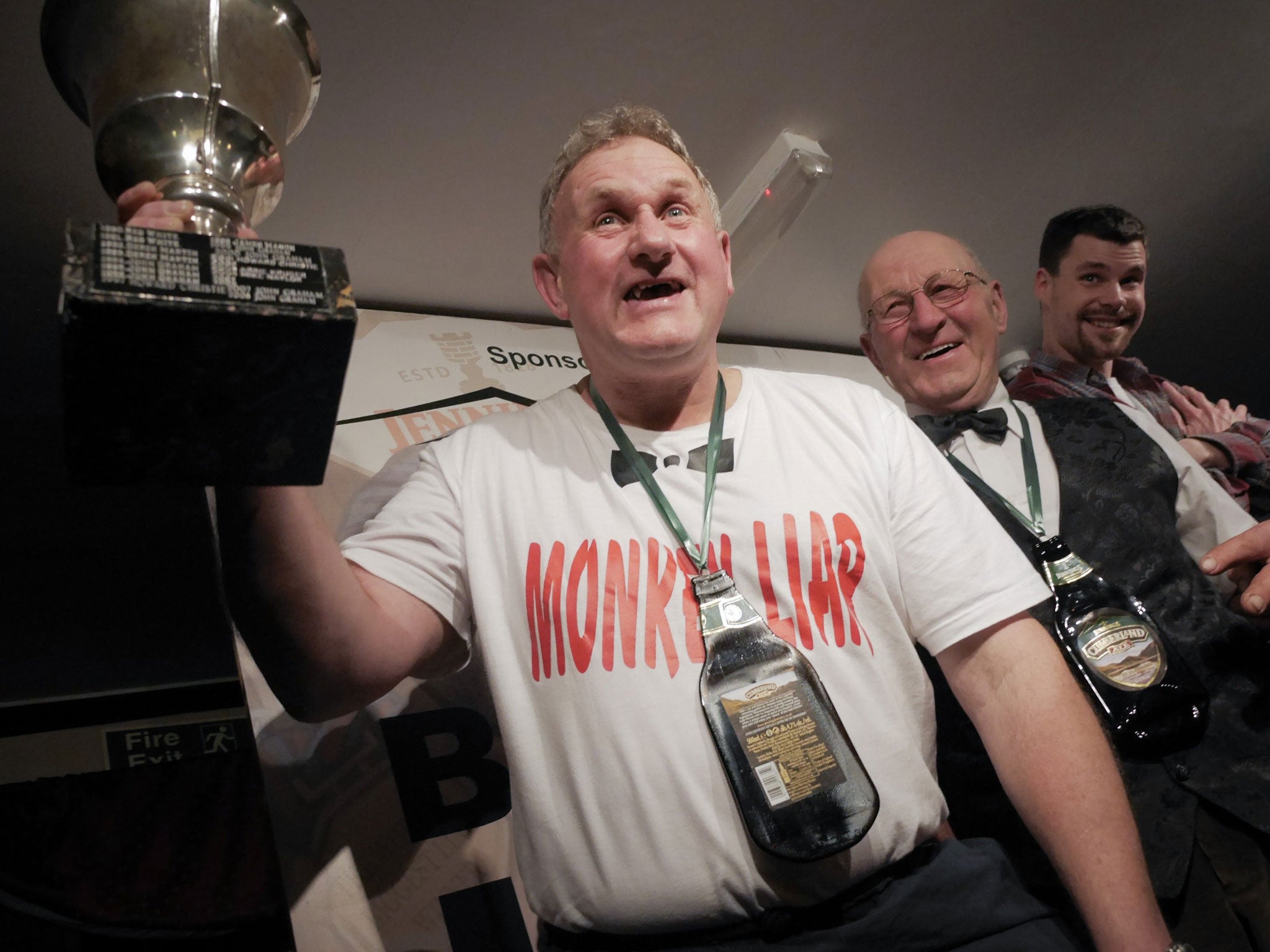Story of mythical marine creature takes top prize at Cumbria's World's Biggest Liar competition
Mike Naylor, aka Monkey Liar, defeats tall tales of 11 fibbers to claim £25 prize

Your support helps us to tell the story
From reproductive rights to climate change to Big Tech, The Independent is on the ground when the story is developing. Whether it's investigating the financials of Elon Musk's pro-Trump PAC or producing our latest documentary, 'The A Word', which shines a light on the American women fighting for reproductive rights, we know how important it is to parse out the facts from the messaging.
At such a critical moment in US history, we need reporters on the ground. Your donation allows us to keep sending journalists to speak to both sides of the story.
The Independent is trusted by Americans across the entire political spectrum. And unlike many other quality news outlets, we choose not to lock Americans out of our reporting and analysis with paywalls. We believe quality journalism should be available to everyone, paid for by those who can afford it.
Your support makes all the difference.The X Factor gave us Leona Lewis; Britain’s Got Talent propelled Susan Boyle to unlikely global stardom. Even New Faces bequeathed the Chuckle Brothers to a grateful world.
Yet although it continues to exert a magnetic effect on the world’s media as a living breathing emblem of English eccentricity, the World’s Biggest Liar competition stubbornly refuses to yield a household name from its growing roll call of winners.
On Thursday night, a packed function room at the historic Bridge Inn in Wasdale, Cumbria listened in slack-jawed disbelief to the tall tales of 11 fibbers – all intent on claiming the title for relaying the most preposterous story.
Clutching his cheque for £25, a battered tin cup and a case of Jennings ales, victorious Mike Naylor aka Monkey Liar had his feet firmly on the ground.
“It’s the third time I have won so I suppose I wouldn’t mind a bash at judging it next time,” he said. Mr Naylor, 54, a farm health advisor from Wasdale, is typical of previous winners.
His meandering shaggy dog story describing the exploits of a mythical marine creature who splits its time between the inky waters of Loch Ness and the local Wastwater, the deepest lake in England, shows a local man, acting out a local tradition for the noblest of intentions – because he enjoys it.
Citing his comedy heroes as “Les Dawson, Tommy Cooper and David Cameron” he said: “I want to wake up every day and have a laugh. I lost my sister last year at 57 and it was a really sad time. I’ve raised a lot of money for cancer and I always like to help people.”
Competitive lie telling in the Western Lakes dates back to the 19th century when publican Will Ritson used to entertain intrepid upper class outsiders by spinning them a few yarns, typically about the region’s outsize turnips which he claimed locals used as sheds.
The tradition was rekindled following his death and since then has become a global media phenomenon attracting attention everywhere from the New York Times to Japanese TV.
However it continues to stick defiantly to its roots. Organisers have resisted calls to raise the prize money to £500 or to relocate the event to the relative grandeur of Whitehaven’s Civic Hall.
Judge Gaynor Green said there was little appetite for change. “There is something special about a competition that is so local that attracts attention from all over the world,” she said.
To the untrained ear, the West Cumberland dialect with its twangs of Norse, Scots and English can be difficult. Outsiders have generally struggled. The first “foreigner” to prevail was South African Abrie Krueger in 2003. The only woman to emerge victorious was comedian Sue Perkins who in 2006 regaled the audience with her story about flatulent sheep – “muttons of mass destruction” – and the demise of the ozone layer.
Last year’s winner Jack Harvey, 26, from Whitehaven, is the youngest person to lift the tin cup. This year he was squeezed into third place by seven-time winner Johnny “Liar” Graham.
Mr Harvey’s surreally entertaining untruth about finding himself in a rap contest with John Paul Jones – the American sea captain who pummelled Whitehaven during the revolutionary wars – perhaps failed to chime with an older crowd.
With at least three decades separating him from the rest of the all-male contestants, he agreed that the competition was in need of fresh blood.
“It is something that should be encouraged. People are happy with the way things are. Tradition is OK. Tradition is comfortable. That is fine. But we need to celebrate and encourage diversity. It (the competition) needs to generate the idea that you don’t have to be a 65-year-old man to win,” he said.
Join our commenting forum
Join thought-provoking conversations, follow other Independent readers and see their replies
Comments